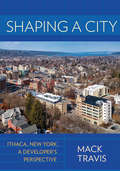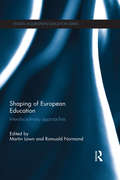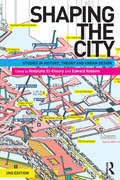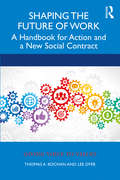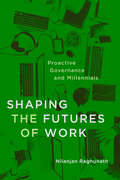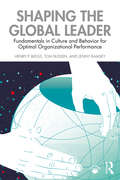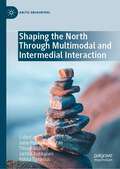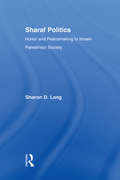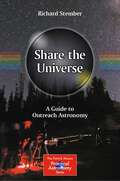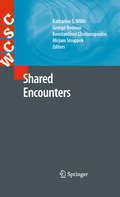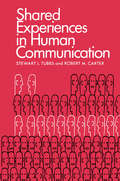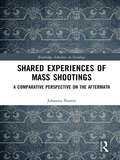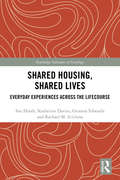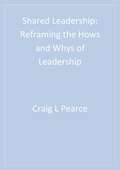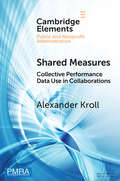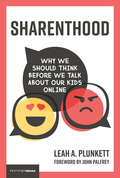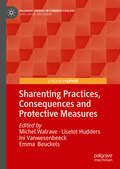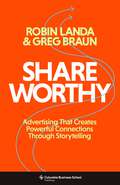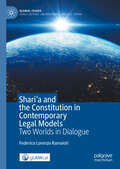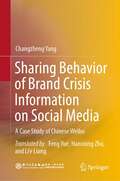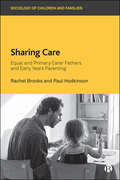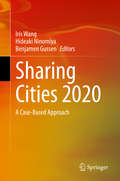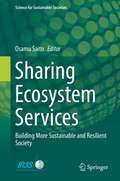- Table View
- List View
Shaping a City: Ithaca, New York, a Developer's Perspective
by Mack TravisPicture your downtown vacant, boarded up, while the malls surrounding your city are thriving. What would you do?In 1974 the politicians, merchants, community leaders, and business and property owners, of Ithaca, New York, joined together to transform main street into a pedestrian mall. Cornell University began an Industrial Research Park to keep and attract jobs. Developers began renovating run-down housing. City Planners crafted a long-range plan utilizing State legislation permitting a Business Improvement District (BID), with taxing authority to raise up to 20 percent of the City tax rate focused on downtown redevelopment.Shaping a City is the behind-the-scenes story of one developer’s involvement, from first buying and renovating small houses, gradually expanding his thinking and projects to include a recognition of the interdependence of the entire city—jobs, infrastructure, retail, housing, industry, taxation, banking and City Planning. It is the story of how he, along with other local developers transformed a quiet, economically challenged upstate New York town into one that is recognized nationally as among the best small cities in the country.The lessons and principles of personal relationships, cooperation and collaboration, the importance of density, and the power of a Business Improvement District to catalyze change, are ones you can take home for the development and revitalization of your city.
Shaping of European Education: Interdisciplinary approaches (Studies in European Education)
by Romuald Normand Martin LawnThe range, speed and scale of Europeanizing effects in education, and their complexity, has produced a relatively new field of study. Using scholarship and research drawn from sociology, politics and education, this book examines the rise of international and transnational policy and the flow of data and people around Europe to study Europeanizing processes and situations in education. Each chapter creates a space for policy research on European education, involving a range of disciplines to develop empirical studies about European institutions, networks and processes; the interplay between policy-makers, stakeholders, experts, and researchers; and the space between the European and the national. The volume investigates the construction of European education, exploring the consideration of the role of think tanks and consultancies, international organizations, researcher mobilities, standards, indicators of higher education, and cultural metaphor. Bringing together international contributors from a variety of disciplines across Europe, the book will be of key value to academics, researchers and postgraduate students in the fields of education studies, politics and sociology.
Shaping the City: Studies in History, Theory and Urban Design
by Rodolphe El-Khoury Edward RobbinsTaking on the key issues in urban design, Shaping the City examines the critical ideas that have driven these themes and debates through a study of particular cities at important periods in their development. As well as retaining crucial discussions about cities such as Los Angeles, Atlanta, Chicago, Detroit, Philadelphia, and Brasilia at particular moments in their history that exemplified the problems and themes at hand like the mega-city, the post-colonial city and New Urbanism, in this new edition the editors have introduced new case studies critical to any study of contemporary urbanism – China, Dubai, Tijuana and the wider issues of informal cities in the Global South. The book serves as both a textbook for classes in urban design, planning and theory and is also attractive to the increasing interest in urbanism by scholars in other fields. Shaping the City provides an essential overview of the range and variety of urbanisms and urban issues that are critical to an understanding of contemporary urbanism.
Shaping the Future of Work: A Handbook for Action and a New Social Contract (Giving Voice to Values)
by Thomas A. Kochan Lee DyerThis book provides a clear roadmap for the roles workers and leaders in business, labor, education, and government must play in building a new social contract for all to prosper. It is a call to action for a collaborative effort to develop both high-quality jobs and strong, successful businesses while simultaneously overcoming the deep social and economic divisions that are all too apparent in society today. Written by two leading and trusted experts in the field of employment and work from MIT and Cornell University, this book is a practical, action-oriented guide. Readers will feel empowered to take actions needed to shape a better future of work for themselves, their employees, their co-workers, and others they may represent. It emphasizes the need to fix America's broken social contract and reimagine a new one. The most important message of this book is that we have the ability to shape the work of the future by harnessing the power of new technologies. The book is essential reading for business executives, labor leaders and workforce advocates, government policy makers, politicians, and anyone who is interested in using emerging knowledge and technologies to drive innovation, creating high-quality jobs, and shaping a more broadly shared prosperity.
Shaping the Futures of Work: Proactive Governance and Millennials
by Nilanjan RaghunathThe widespread belief that tech-savvy, educated millennials are well positioned to handle the challenges of the fourth industrial revolution is unfounded. It does not fully grasp the reality of a flux society, where relevant technological skills and knowledge are continuously changing: no one is permanently tech-savvy. Millennials, like other generations, face the challenge of needing to continually reskill. This has compounded their struggle to begin their careers at a point when there is no longer any guarantee of lifetime employment or retirement at a set age.Shaping the Futures of Work is a timely sociological exploration of the impact of technological innovations on employment. Nilanjan Raghunath proposes that stakeholders such as states, enterprises, and citizens hold equally important roles in ensuring that people can adapt, innovate, and thrive within conditions of flux. A promising model focuses on collaboration and proactive governance. While good governance includes citizen engagement, proactive governance goes one step further, creating inclusive policies, roadmaps, and infrastructure for social and economic progress. This book reveals that lifelong learning and adaptability are imperative, even for well-educated professionals. Using Singapore and Singaporean millennials as a case study, Raghunath examines proactive governance and delivers research and analysis to elucidate career trajectories, pointing to a work ethic that aims to engage with technological futures.Looking at local and global sociological literature to confirm the need for proactive governance, Shaping the Futures of Work suggests that Singaporean millennials – and professionals around the world – need to better prepare themselves for flux, risk, failure, and reinvention for career mobility.
Shaping the Global Leader: Fundamentals in Culture and Behavior for Optimal Organizational Performance
by Henry Biggs Tom Bussen Lenny RamseyConsidering behavioral norms in their cultural contexts, this book arrives at a fully operational international leadership theory – and makes it accessible to academic and professional readers alike. Shaping the Global Leader fundamentally covers eight cultural dimensions gleaned from acclaimed international leadership scholars such as Geert Hofstede and the GLOBE study authors. Each cultural dimension is followed by interviews of renowned organizational leaders who relate their experiences in that area and each section underscores strategies for moving forward. The authors highlight critical lessons from classic behavioral psychology experiments and apply these findings to the international organizational context. This book serves as an eminently readable and enlightening handbook for those working, leading or studying interculturally. Both students and professionals in international leadership or business will be provided with clear and actionable organizational insights for an increasingly complex global landscape.
Shaping the North Through Multimodal and Intermedial Interaction (Arctic Encounters)
by Tiina Räisänen Jarkko Toikkanen Juha-Pekka Alarauhio Riikka TumeliusThis book emphasizes humans interacting and participating in making meaning with multimodal resources and relating experience via intermedial means. The contributors explore diverse ways of mediating work, education, arts, and culture, and ask how interactive participation involves experiences of the north either as a physical setting or a more abstract cultural condition that shapes the activity. The ten chapters engage with topical theoretical debate and put novel methodology to test, providing essential reading for scholars and students in this rich and rapidly developing global field of research.
Sharaf Politics: Honor and Peacemaking in Israeli-Palestinian Society (Middle East Studies: History, Politics & Law)
by Sharon D. LangThis book examines the Arabic conflict resolution method known as "sulha." In this process, notable male elders mediate conflicts between and within Arab communities. A lengthy process of political jockeying culminates in a ceremony that peaks when "enemies" shake hands and publicly forgive the crimes of the other. The reality of actual sulha deviates considerably from the ideal, but both the official framework and the actual events point to a deep seated valorization of peace and reconciliation in Israeli-Palestinian society.
Share the Universe: A Guide to Outreach Astronomy (The Patrick Moore Practical Astronomy Series)
by Richard StemberAs every astronomer knows, astronomy is one of the most approachable and inspiring of the natural sciences. It appeals to both children and adults while drawing in curious minds with its immense distances and unimaginably powerful natural phenomena. In this book, you will find out how to be a part of the journey in sharing scientific knowledge and inspiring minds of all ages. By using the affordable tools and techniques provided in this book – you will learn about how astronomers can easily engage people with views of our solar system’s planets, moons, and even more distant objects like nebulas, stellar nurseries, and remnants of exploded stars. Perhaps most importantly, the natural appeal of this science is helpful when explaining to non-scientists how science “works." What is science and scientific methodology? How is it used to give mankind knowledge and solutions to problems that we face in many scientific fields including medicine? How does it differ from other sources of information? This book, sprinkled with the author’s 24 plus years of personal experience in public outreach, offers practical techniques to engage, educate, and inspire all who are interested in the field of astronomy.
Shared Beginnings, Divergent Lives: Delinquent Boys to Age 70
by John H. Laub Robert J. SampsonThis book analyzes newly collected data on crime and social development up to age 70 for 500 men who were remanded to reform school in the 1940s. Born in Boston in the late 1920s and early 1930s, these men were the subjects of the classic study Unraveling Juvenile Delinquency by Sheldon and Eleanor Glueck (1950). Updating their lives at the close of the twentieth century, and connecting their adult experiences to childhood, this book is arguably the longest longitudinal study of age, crime, and the life course to date. John Laub and Robert Sampson's long-term data, combined with in-depth interviews, defy the conventional wisdom that links individual traits such as poor verbal skills, limited self-control, and difficult temperament to long-term trajectories of offending. The authors reject the idea of categorizing offenders to reveal etiologies of offending--rather, they connect variability in behavior to social context. They find that men who desisted from crime were rooted in structural routines and had strong social ties to family and community. By uniting life-history narratives with rigorous data analysis, the authors shed new light on long-term trajectories of crime and current policies of crime control.
Shared Beginnings, Divergent Lives: Delinquent Boys to Age 70
by John H. Laub Robert J. SampsonThis book analyzes newly collected data on crime and social development up to age 70 for 500 men who were remanded to reform school in the 1940s. Born in Boston in the late 1920s and early 1930s, these men were the subjects of the classic study Unraveling Juvenile Delinquency by Sheldon and Eleanor Glueck (1950). Updating their lives at the close of the twentieth century, and connecting their adult experiences to childhood, this book is arguably the longest longitudinal study of age, crime, and the life course to date. John Laub and Robert Sampson's long-term data, combined with in-depth interviews, defy the conventional wisdom that links individual traits such as poor verbal skills, limited self-control, and difficult temperament to long-term trajectories of offending. The authors reject the idea of categorizing offenders to reveal etiologies of offending--rather, they connect variability in behavior to social context. They find that men who desisted from crime were rooted in structural routines and had strong social ties to family and community. By uniting life-history narratives with rigorous data analysis, the authors shed new light on long-term trajectories of crime and current policies of crime control.
Shared Encounters
by Katharine S. Willis Konstantinos Chorianopoulos Mirjam Struppek George RoussosEvery day we share encounters with others as we inhabit the space around us. In offering insights and knowledge on this increasingly important topic, this book introduces a range of empirical and theoretical approaches to the study of shared encounters. It highlights the multifaceted nature of collective experience and provides a deeper understanding of the nature and value of shared encounters in everyday life. Divided into four sections, each section comprises a set of chapters on a different topic and is introduced by a key author in the field who provides an overview of the content. The book itself is introduced by Paul Dourish, who sets the theme of shared encounters in the context of technological and social change over the last fifteen years. The four sections that follow consider the characteristics of shared encounters and describe how they can be supported in different settings: the first section, introduced by Barry Brown, looks at shared experiences. George Roussos, in the second section, presents playful encounters. Malcolm McCulloch introduces the section on spatial settings and - last but not least - Elizabeth Churchill previews the topic of social glue. The individual chapters that accompany each part offer particular perspectives on the main topic and provide detailed insights from the author's own research background. A valuable reference for anyone designing ubiquitous media, mobile social software and LBS applications, this volume will also be useful to researchers, students and practitioners in fields ranging from computer science to urban studies.
Shared Experiences in Human Communication
by Stewart L. TubbsA novel approach to traditional subjects, the wide variety of opinions, and the extensive introductory material lift this book out of the ordinary “readings" class, and will reward the reader with understanding and appreciation of a complex subject. This collection of 37 provocative selections on human communication shares with the reader the experience and insights of some of the best minds in the discipline. The selections for the most part deal with traditional communication topics in a novel way. For example, in the chapter on verbal communication, there is a selection on profane language; in the chapter on nonverbal communication, there is a section entitled “The Silent Language of Love”; in the chapter on small group communication, there’s the Parkinson article on laws in groups; and in the chapter on mass communication, there’s one on today’s interest in sexually oriented magazines. The entire spectrum of topics usually found in beginning courses in speech communication is here. An extensive Section Two includes discussion on the psychological and transactional analysis views of communication. A brief introduction precedes each section focusing on the key ideas of each reading. Sources include the Journal of Communication, Industry Week, Journalism Quarterly, Psychology Today, Supervisory Management, Journal of Social Issues, Harvard Business Review, and Today's Speech.
Shared Experiences of Mass Shootings: A Comparative Perspective on the Aftermath (Routledge Advances in Sociology)
by Johanna NurmiMass violence and terrorism are a salient phenomenon in the late modern society, showing no sign of decline. Proactive results from the long, ongoing debate of how to address these issues are therefore increasingly necessary – not just in the context of prevention, but also in the context of the aftermath. Shared Experiences of Mass Shootings develops an understanding of the collective experience, consequences and recovery processes after mass shootings. Drawing from in-depth case studies of two mass shootings in Finland and comparing them with other international cases, it explores how communities work through violent tragedies employing social memory and memorialization practices that can be seen as either tools for recovery, or as something that needs to be restricted. Contributing a novel understanding of how experiencing mass violence is deeply gendered through the social patterns and narratives of men’s and women’s emotions, this timely monograph will appeal to undergraduate and postgraduate students, as well as postdoctoral researchers, interested in fields such as: Sociology of Violence, Criminology, Social Work, Memory Studies, Media Studies and Cultural Trauma.
Shared Housing, Shared Lives: Everyday Experiences Across the Lifecourse (Routledge Advances in Sociology)
by Gemma Edwards Sue Heath Katherine Davies Rachael SciclunaWith a growing population, rising housing costs and housing providers struggling to meet demand for affordable accommodation, more and more people in the UK find themselves sharing their living spaces with people from outside of their families at some point in their lives. Focusing on sharers in a wide variety of contexts and at all stages of the life course, Shared Housing, Shared Lives demonstrates how personal relationships are the key to whether shared living arrangements falter or flourish. Indeed, this book demonstrates how issues such as finances, domestic space and daily routines are all factors which can impact upon personal relationships and wider understandings of the home and privacy. By directing attention towards people and relationships rather than bricks and mortar, Shared Housing, Shared Lives is essential reading for students and researchers in fields such as sociology, housing studies, social policy, cultural anthropology and demography, as well as for researchers and practitioners working in these areas
Shared Leadership: Reframing the Hows and Whys of Leadership
by Jay A. Conger Dr Craig L. PearceShared Leadership: Reframing the Hows and Whys of Leadership brings together the foremost thinkers on the subject and is the first book of its kind to address the conceptual, methodological, and practical issues for shared leadership. Its aim is to advance understanding along many dimensions of the shared leadership phenomenon: its dynamics, moderators, appropriate settings, facilitating factors, contingencies, measurement, practice implications, and directions for the future. The volume provides a realistic and practical discussion of the benefits, as well as the risks and problems, associated with shared leadership. It will serve as an indispensable guide for researchers and practicing managers in identifying where and when shared leadership may be appropriate for organizations and teams.
Shared Measures: Collective Performance Data Use in Collaborations (Elements in Public and Nonprofit Administration)
by Alexander KrollTraditionally, performance metrics and data have been used to hold organizations accountable. But public service provision is not merely hierarchical anymore. Increasingly, we see partnerships among government agencies, private or nonprofit organizations, and civil society groups. Such collaborations may also use goals, measures, and data to manage group efforts, however, the application of performance practices here will likely follow a different logic. This Element introduces the concepts of “shared measures” and “collective data use” to add collaborative, relational elements to existing performance management theory. It draws on a case study of collaboratives in North Carolina that were established to develop community responses to the opioid epidemic. To explain the use of shared performance measures and data within these collaboratives, this Element studies the role of factors such as group composition, participatory structures, social relationships, distributed leadership, group culture, and value congruence.
Sharenthood: Why We Should Think before We Talk about Our Kids Online (Strong Ideas)
by Leah A. PlunkettFrom baby pictures in the cloud to a high school's digital surveillance system: how adults unwittingly compromise children's privacy online.Our children's first digital footprints are made before they can walk—even before they are born—as parents use fertility apps to aid conception, post ultrasound images, and share their baby's hospital mug shot. Then, in rapid succession come terabytes of baby pictures stored in the cloud, digital baby monitors with built-in artificial intelligence, and real-time updates from daycare. When school starts, there are cafeteria cards that catalog food purchases, bus passes that track when kids are on and off the bus, electronic health records in the nurse's office, and a school surveillance system that has eyes everywhere. Unwittingly, parents, teachers, and other trusted adults are compiling digital dossiers for children that could be available to everyone—friends, employers, law enforcement—forever. In this incisive book, Leah Plunkett examines the implications of “sharenthood”—adults' excessive digital sharing of children's data. She outlines the mistakes adults make with kids' private information, the risks that result, and the legal system that enables “sharenting.”Plunkett describes various modes of sharenting—including “commercial sharenting,” efforts by parents to use their families' private experiences to make money—and unpacks the faulty assumptions made by our legal system about children, parents, and privacy. She proposes a “thought compass” to guide adults in their decision making about children's digital data: play, forget, connect, and respect. Enshrining every false step and bad choice, Plunkett argues, can rob children of their chance to explore and learn lessons. The Internet needs to forget. We need to remember.
Sharenting Practices, Consequences and Protective Measures (Palgrave Studies in Cyberpsychology)
by Michel Walrave Liselot Hudders Ini Vanwesenbeeck Emma BeuckelsThis book provides an interdisciplinary analysis of the sharenting phenomena, while discussing the various stakeholders involved, e.g., the portrayed children and adolescents, (grand)parents and other family members. Sharenting, i.e. parents’ disclosure of personal information related to their children on social media, is increasingly the subject of public debate. Moreover, some parents participate in influencer sharenting, where they generate revenue by featuring their children in professionalised and commercialised social media content, often in collaboration with brands. However, while sharing personal information of children has become common practice, concerns arise regarding its risks. Consequently, sharenting has been studied in several disciplines, including communication studies, psychology, marketing, criminology, law, sociology, and health sciences. This interdisciplinary approach, adopted by this book, generates several suggestions for future research, alongside practical implications for parents and policy makers.
Shareworthy: Advertising That Creates Powerful Connections Through Storytelling
by Robin Landa Greg BraunIn today’s highly competitive marketplace, a brand must tell meaningful stories that resonate with their target audiences across media channels. People want more than a utilitarian benefit—stories are ultimately what drive us to engage with brands. And we want to align ourselves with brands that are ethical and purpose-driven and that take responsibility for their actions and messaging.This indispensable book reveals what makes brand stories “shareworthy” and guides readers through creating relevant and resonant advertising. Combining practitioner and academic perspectives, Robin Landa and Greg Braun offer a roadmap for conceiving and developing creative advertising campaigns that are responsible and inclusive—and that audiences enthusiastically share. They demonstrate that shareworthy storytelling embraces diversity, equity, inclusion, purpose, and brand activism and eschews tropes, stereotypes, and negative messaging. The book features candid interviews with expert practitioners spanning diverse global communities who share the hard-earned wisdom of their award-winning campaigns, as well as insightful case studies from major companies such as Amazon, Nike, the New York Times, and Dove. Timely and actionable, Shareworthy shows current and aspiring marketing professionals how to craft a story, connect with the audience, and embrace social responsibility throughout.
Shari'a and the Constitution in Contemporary Legal Models: Two Worlds in Dialogue (Global Issues)
by Federico Lorenzo RamaioliThis comparative law book aims at formulating a new analytical approach to constitutional comparisons, assuming as a starting point the different legal perspectives implied in the (Sunni) Islamic outlook on the juridical phenomena and the Western concept of law, with particular reference to constitutionalism. The volume adopts a wider and comprehensive viewpoint, comparing the different ways in which the Islamic sharīʿa and Western legal categories interact, regardless of substantive contents of specific provisions, thus avoiding conceptual biases that can sometime affect present literature on the matter. The book explores the various dynamics subtended to the interactions between sharīʿa and Western constitutionalism, providing a new classification to the different contemporary models. The philosophical and legal comparisons are analyzed in a dynamic way, based on a wide range of contemporary constitutional systems, virtually encompassing all the States in which Sunni Islam plays a major cultural role, and taking also into consideration non-State actors and non-recognized actors."Published in cooperation with gLAWcal - Global Law Initiatives for Sustainable Development, Hornchurch, Essex, United Kingdom".
Sharing Behavior of Brand Crisis Information on Social Media: A Case Study of Chinese Weibo
by Changzheng YangThis book adopted 66 brand crisis events as research samples taking place from 2010 to 2016 on social media (Chinese Weibo), performs research on influence mechanism of brand-crisis information-sharing behavior on social media from contextual perspective. The book explores into the fluctuation characteristics of information-sharing behavior, the contextual influence factors, both the static and dynamic mechanism of information-sharing behavior, and regulation measures of crisis information sharing behavior. The important features of the book are reflected in accurate analysis of the autocorrelation, trend characteristics, periodic characteristics and cluster characteristics of the fluctuation of crisis information sharing behavior, and deep exploration of dynamic mechanism and static mechanism of the time lag characteristics, impulsive disturbance, and marginal influence of the impact of information sharing behavior from perspective of situational factors. The book mainly focuses on the field of brand crisis management, and construct the formation and evolution mechanism of brand crisis information sharing behavior from both vertical and horizontal dimensions through a combination of theoretical exposition and case analysis, so that readers can got a clear understanding of brand crisis information communication and management through dimension reduction. The book can be used as a textbook for undergraduates and postgraduates in economics and management in colleges and universities, can also be a reference for business managers, scientific researchers and others interested in the field of crisis management.
Sharing Care: Equal and Primary Carer Fathers and Early Years Parenting (Sociology of Children and Families)
by Paul Hodkinson Rachel BrooksDrawing on detailed qualitative research, this timely study explores the experiences of fathers who take on equal or primary care responsibilities for young children. The authors examine what prompts these arrangements, how fathers adjust to their caregiving roles over time, and what challenges they face along the way. The book asks what would encourage more fathers to become primary or equal caregivers, and how we can make things easier for those who do. Offering new academic insight and practical recommendations, this will be key reading for those interested in parenting, families and gender, including researchers, policymakers, practitioners and students.
Sharing Cities 2020: A Case-Based Approach
by Benjamen Gussen Iris Wang Hideaki NinomiyaThis book provides valuable insights into how cities are innovating in the field of the sharing economy through case studies. Each chapter explains how different cities have employed the sharing economy to solve their sui generis problems. The concept of Sharing Cities is getting considerable traction with grassroots groups and city governments around the world. Starting with the earliest Sharing City, Seoul, under the efforts of different Sharing Economy Associations and Organizations, more and more cities are being transformed. This book aims to highlight the positive changes that the sharing economy brings to cities and will be a valuable reference to those working in this emerging field.
Sharing Ecosystem Services: Building More Sustainable and Resilient Society (Science for Sustainable Societies)
by Osamu SaitoUsing “the sharing paradigm” as a guiding concept, this book demonstrates that “sharing” has much greater potential to make rural society resilient, sustainable and inclusive through enriching all four sharing dimensions: informal, mediated, communal and commercial sharing. The chapters are divided into two parts, one that focuses on case studies of the sharing ecosystem services in Japan, the other on case studies from around the world including in the regions of Africa, Asia-Pacific, South America and Europe. Reflecting the recent growing attention to sharing concept and its application to economic and urban context, this publication explores opportunities and challenges to build more resilient and sustainable society in harmony with nature by critical examination of sharing practices in rural landscapes and seascapes around the world. This book introduces not only traditional communal and non-market sharing practices in different rural areas, but also new forms of sharing through integration of traditional practices and modern science and technologies.
